#Symeon the New Theologian
Text


--Symeon the New Theologian
67 notes
·
View notes
Text
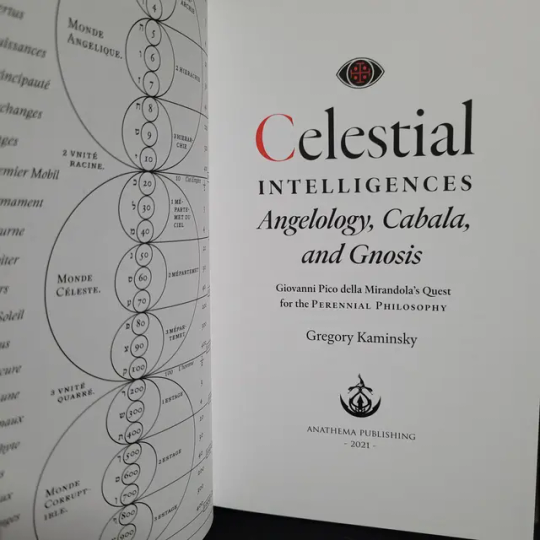
“With its roots in Jacob’s ladder and elaborated in biblical Jewish merkavah mysticism, the doctrine known later in Greek as theosis is found in the writings of Dionysius the Areopagite, and Symeon the New Theologian, as well as the Jewish Kabbalah as demonstrated by Joseph Karo, the Baal Shem Tov and his disciples. In other words, Pico intends his angelology in these two works to be understood by the learned classes throughout Europe as a prescription to achieve union with the divine.
By “divine union,” what is meant? The final snapshot of this arduous and paradoxical, or perhaps even inconceivable journey is different in various traditions. Different from the ecstatic, fiery, yet agonizing transformation of the prophet Enoch into the archangel Metatron, called “a lesser YHVH” in 3 Enoch,7 or the graphic, luminous transformation of the mystical abbot of St. Mammas Monastery in Constantinople, Symeon the New Theologian (949–1022), into the Body of Christ in the tenth century CE,8 Pico’s vision of theosis was more akin to sharing God’s “mind stream.” That is, instead of a merger of the corporeal human aspirant into the incorporeal infinitude of the godhead, theosis for Pico was a kind of gnosis and a point of view that was simultaneously individuated and collectively unified. This can be seen in his description of ultimate divine union as possible while the philosopher is incarnate, more akin to a supremely exalted state of consciousness. While achieving a state like this necessitated neglect of bodily cares and desires according to Pico, he also asserted that this prescriptive formula for divinization actually purified the body as a dwelling place for the divine presence.”
Celestial Intelligences: Angelology, Cabala, and Gnosis: Giovanni Pico della Mirandola's Quest for the Perennial Philosophy
#Perennial Philosophy#Divine Union#Gnosis#Theosis#Merkavah mysticism#Giovanni Pico della Mirandola#Divinization#Angelology#Celestial Intelligences#The esoteric tradition of the West#Kabbalah#Magic#Cabala#Christian Cabala#The orders of Angels#Jacob’s ladder#Dionysius the Areopagite#Symeon the New Theologian#Union with the Divine#Archangel Metatron#Picos vision of Theosis#The process of Spiritual Ascension#Kabbalistic Tree of Life#Angelic Hierarchy#The Cosmic Hierarchy#Renaissance Philosophy#Philosophical Wanderings
2 notes
·
View notes
Text
2023 OCTOBER 09 Monday
"Plunged in the night of life's worry, and there I sustained many wounds. Having gone up I bear many blows in my soul, and I cry out amid the suffering and trouble of my heart. I slacked off Master as I took confidence in my self. I was dragged down by worry about perceptible matters. I fell down, wretched, in the concern of life's problems. Because of this I shout to you, asking to be purified anew, benevolent one. To be lifted up to my first beauty, to enjoy fully your light now and always, and to all ages, Amen."
~ Symeon the New Theologian, Hymn 46
#bible#gospel#further reading#Symeon the New Theologian#Hymn 46#hymn#night of life's worry#wounds#soul#suffering#troubles#heart#confidence#self#worry#perceptible matters#wretched#life#problems#purify#anew#benevolent#God#Lord#Jesus#Christ#Master#first beauty#light#ages
0 notes
Text
An Invocation to the Holy Spirit
Come, true light.
Come, light eternal.
Come, hidden mystery.
Come, treasure without name.
Come, reality beyond all words.
Come, person beyond all understanding.
Come, rejoicing without end.
Come, light that knows no evening.
Come, unfailing expectation of the saved.
Come, raising of the fallen.
Come, resurrection of the dead.
Come, all-powerful, for unceasingly you create, refashion and change all things by your will alone.
Come, invisible whom none may touch and handle.
Come, for you continue always unmoved, yet at every instant you are wholly in movement; you draw near to us who lie in hell, yet you remain higher than the heavens.
Come, for your name fills our hearts with longing and is ever on our lips; yet who you are and what your nature is, we cannot say or know.
Come, Alone to the alone.
Come, for you are yourself the desire that is within me.
Come, my breath and my life.
Come, the consolation of my humble soul.
Come, my joy, my glory, my endless delight.
-- Saint Symeon the New Theologian
26 notes
·
View notes
Photo

“…let us look and carefully examine what is the mystery of that resurrection of Christ our God which takes place mystically in us at all times, if we are willing, and how Christ is buried in us as in a tomb and how He unites Himself to our souls and rises again, raising us with Himself...
…the resurrection of Christ takes place in each of us who believes, and that not once, but every hour… when Christ the Master arises in us.”
~St. Symeon the New Theologian
#Orthodox Christian#Icons#saints#St. Symeon the New Theologian#Christ is buried in us as a tomb#Christ unites Himself with our souls and resurrects us with Himself#mystery#mystical#Lord Jesus#Christ is the Master
21 notes
·
View notes
Text

St. Symeon the New Theologian emphasized how beneficial fasting is:
Let each one of us keep in mind the benefit of fasting and what gifts from God he has enjoyed in these few [fasting] days and so become more eager for the days to come. For this healer of our souls is effective, in the case of one to quieten the fevers and impulses of the flesh, in another to assuage bad temper, in yet another to drive away sleep, in another to stir up zeal, and in yet another to restore purity of mind and to set him free from evil thoughts. In one it will control his unbridled tongue and, as it were by a bit, restrain it by the fear of God and prevent it from uttering idle or corrupt words. In another it will invisibly guard his eyes and fix them on high instead of allowing them to roam hither and thither, and thus cause him to look on himself and teach him to be mindful of his own faults and shortcomings. Fasting gradually disperses and drives away spiritual darkness and the veil of sin that lies on the soul, just as the sun dispels the mist. Fasting enables us spiritually to see that spiritual air in which Christ, the Sun who knows no setting, does not rise, but shines without ceasing. Fasting, aided by vigil, penetrates and softens hardness of heart. Where once were the vapors of drunkenness it causes fountains of compunction to spring forth. I beseech you, brethren, let each of us strive that this may happen in us!
17 notes
·
View notes
Photo

Today we celebrate our Venerable Father Symeon the New Theologian. Saint Symeon was a monk in the 11th Century whose writings heavily influenced the hesychastic movement in the 14th Century. He is one of only three saints in the entire Eastern Orthodox Church to be granted the title of “Theologian”, not in the academic sense, but rather in actual spirituality. Saint Symeon reposed on March 12 but since this falls during Great Lent, his feast is transferred to October 12. May he intercede for us always + #saint #symeon #new #theologian #hesychasm #hesychast #monk #orthodox #saintoftheday (at Marmara, Balikesir, Turkey) https://www.instagram.com/p/CjlW8OaLAaK/?igshid=NGJjMDIxMWI=
16 notes
·
View notes
Text
“𝐖𝐡𝐲 𝐝𝐨 𝐲𝐨𝐮 𝐧𝐨𝐭 𝐜𝐨𝐧𝐬𝐢𝐝𝐞𝐫 𝐭𝐡𝐚𝐭 𝐆𝐨𝐝 𝐬𝐞𝐧𝐭 𝐇𝐢𝐬 𝐨𝐰𝐧 𝐒𝐨𝐧 𝐭𝐨 𝐞𝐚𝐫𝐭𝐡 𝐬𝐨𝐥𝐞𝐥𝐲 𝐟𝐨𝐫 𝐲𝐨𝐮 𝐚𝐧𝐝 𝐲𝐨𝐮𝐫 𝐬𝐚𝐥𝐯𝐚𝐭𝐢𝐨𝐧, 𝐛𝐞𝐜𝐚𝐮𝐬𝐞 𝐇𝐞 𝐟𝐨𝐫𝐞𝐤𝐧𝐞𝐰 𝐚𝐧𝐝 𝐩𝐫𝐞𝐝𝐞𝐬𝐭𝐢𝐧𝐞𝐝 𝐲𝐨𝐮 𝐭𝐨 𝐛𝐞𝐜𝐨𝐦𝐞 𝐇𝐢𝐬 𝐛𝐫𝐨𝐭𝐡𝐞𝐫 𝐚𝐧𝐝 𝐜𝐨-𝐡𝐞𝐢𝐫? 𝐖𝐡𝐲 𝐝𝐨 𝐲𝐨𝐮 𝐧𝐨𝐭 𝐬𝐭𝐫𝐢𝐯𝐞 𝐭𝐨 𝐥𝐨𝐯𝐞 𝐇𝐢𝐦 𝐰𝐢𝐭𝐡 𝐚𝐥𝐥 𝐲𝐨𝐮𝐫 𝐡𝐞𝐚𝐫𝐭 𝐚𝐧𝐝 𝐤𝐞𝐞𝐩 𝐇𝐢𝐬 𝐬𝐚𝐯𝐢𝐧𝐠 𝐜𝐨𝐦𝐦𝐚𝐧𝐝𝐦𝐞𝐧𝐭𝐬 𝐚𝐧𝐝 𝐫𝐚𝐭𝐡𝐞𝐫 𝐧𝐨𝐭 𝐛𝐞𝐥𝐢𝐞𝐯𝐞 𝐭𝐡𝐚𝐭 𝐇𝐞, 𝐰𝐡𝐨 𝐰𝐚𝐬 𝐤𝐢𝐥𝐥𝐞𝐝 𝐟𝐨𝐫 𝐲𝐨𝐮, 𝐰𝐢𝐥𝐥 𝐧𝐨𝐭 𝐥𝐞𝐚𝐯𝐞 𝐲𝐨𝐮 𝐧𝐨𝐫 𝐚𝐥𝐥𝐨𝐰 𝐲𝐨𝐮 𝐭𝐨 𝐩𝐞𝐫𝐢𝐬𝐡?”
- St. Symeon the New Theologian
6 notes
·
View notes
Text
Saints&Reading: Monday, March 25, 2014
march 12_march25
SAINT GREGORY THE DIALOGIST, POPE OF ROME (604)
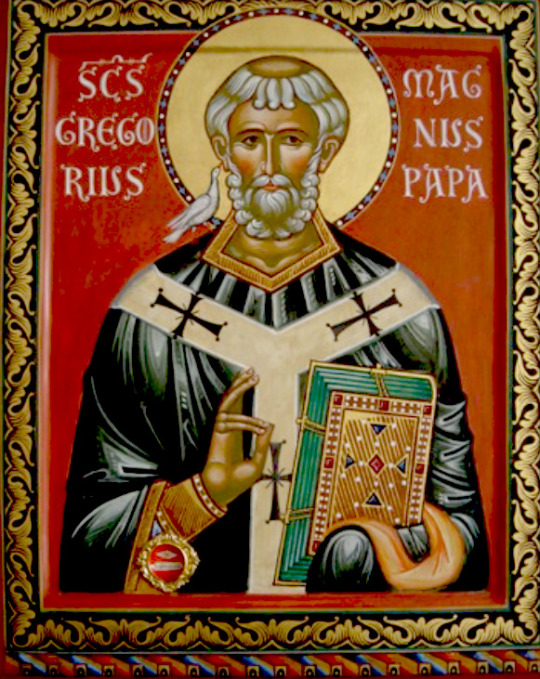
Saint Gregory the Dialogist, Pope of Rome, was born in Rome around the year 540. His grandfather was Pope Felix, and his mother Sylvia (November 4) and aunts Tarsilla and Emiliana were also numbered among the saints by the Roman Church. Having received a most excellent secular education, he attained high government positions.
Leading a God-pleasing life, he yearned for monasticism with all his soul. After the death of his father, Saint Gregory used his inheritance to establish six monasteries. At Rome he founded a monastery dedicated to the holy Apostle Andrew the First-Called, where he received monastic tonsure. Later, on a commission of Pope Pelagius II, Saint Gregory lived for a while in Constantinople. There he wrote his Commentary on the Book of Job.
After the death of Pope Pelagius, Saint Gregory was chosen to the Roman See. For seven months he would not consent to accept this service, considering himself unworthy. He finally accepted consecration only after the persistent entreaties of the clergy and flock.
Wisely leading the Church, Saint Gregory worked tirelessly in propagating the Word of God. Saint Gregory compiled the Liturgy of the Presanctified Gifts in the Latin language, which before him was known only in the verbal tradition. Affirmed by the Sixth Ecumenical Council, this liturgical service was accepted by all the Orthodox Church.
He zealously struggled against the Donatist heresy; he also converted the inhabitants of Brittany, pagans and Goths, who had been adhering to the Arian heresy, to the True Faith.
Saint Gregory has left behind numerous written works. After the appearance of his book, DIALOGUES CONCERNING THE LIFE AND MIRACLES OF THE ITALIAN FATHERS (DIALOGI DE VITA ET MIRACULIS PATRUM ITALIORUM), the saint was called “Dialogus.” His PASTORAL RULE (or LIBER REGULAE PASTORALIS) was well-known. In this work, Saint Gregory describes the model of the true pastor. His letters (848), dealing with moral guidance, have also survived.
Saint Gregory headed the Church for thirteen years, ministering to all the needs of his flock. He was characterized by an extraordinary love of poverty, for which he was granted a vision of the Lord Himself.
As he is known, Pope Saint Gregory the Great died in the year 604, and his relics rest in the cathedral of the holy Apostle Peter in the Vatican.
VENERABLE SYMEON, THE NEW THEOLOGIAN (1022)
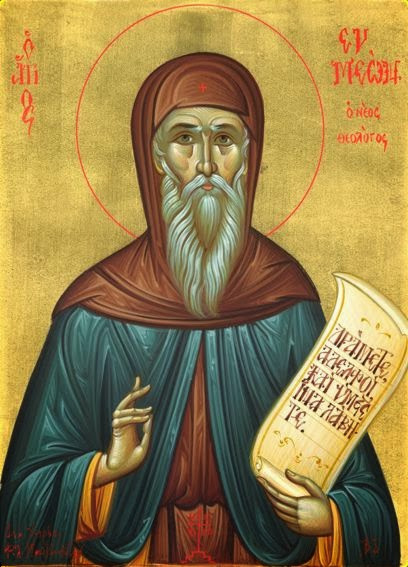
Saint Simeon the New Theologian was born in the year 949 in the city of Galatea (Paphlagonia), and he was educated at Constantinople. His father prepared him for a career at court, and for a certain while the youth occupied a high position at the imperial court. When he was fourteen, he met the renowned Elder Simeon the Pious at the Studion Monastery, who would be a major influence in his spiritual development. He remained in the world for several years preparing himself for the monastic life under the Elder’s guidance, and finally entered the monastery at the age of twenty-seven.
Saint Simeon the Pious recommended to the young man the writings of Saint Mark the Ascetic (March 5) and other spiritual writers. He read these books attentively and tried to put into practice what he read. Three points made by Saint Mark in his work “On the Spiritual Law” (see Vol. I of the English Philokalia) particularly impressed him. First, you should listen to your conscience and do what it tells you if you wish your soul to be healed (Philokalia, p. 115). Second, only by fulfilling the commandments can one obtain the activity of the Holy Spirit. Thirdly, one who prays only with the body and without spiritual knowledge is like the blind man who cried out, “Son of David, have mercy upon me” (Luke 18:38) (Philokalia, p. 111). When the blind man received his sight, however, he called Christ the Son of God (John 9:38).
Saint Simeon was wounded with a love for spiritual beauty, and tried to acquire it. In addition to the Rule given him by his Elder, his conscience told him to add a few more Psalms and prostrations, and to repeat constantly, “Lord Jesus Christ, have mercy upon me.” Naturally, he heeded his conscience.
During the day, he cared for the needs of people living in the palace of Patricius. At night, his prayers grew longer and he remained praying until midnight. Once, as he was praying in this way, a most brilliant divine radiance descended upon him and filled the room. He saw nothing but light all around him, and he was not even aware of the ground beneath his feet.
It seemed to him that he himself became light. Then his mind rose upward to the heavens, and he saw a second light brighter than the light which surrounded him. Then, on the edge of this second light, he seemed to see Saint Simeon the Pious, who had given him Saint Mark the Ascetic to read.
Seven years after this vision, Saint Simeon entered the monastery. There he increased his fasting and vigilance, and learned to renounce his own will.
The Enemy of our salvation stirred up the brethren of the monastery against Saint Simeon, who was indifferent to the praises or reproaches of others. Because of the increased discontent in the monastery, Saint Simeon was sent to the Monastery of Saint Mamas in Constantinople.
There he was tonsured into the monastic schema, and increased his spiritual struggles. He attained to a high spiritual level, and increased his knowledge of spiritual things through reading the Holy Scriptures and the writings of the Fathers, as well as in conversation with holy Elders.
Around the year 980, Saint Simeon was made igumen of the monastery of Saint Mamas and continued in this office for twenty-five years. He repaired and restored the monastery, which had suffered from neglect, and also brought order to the life of the monks.
The strict monastic discipline, for which Saint Simeon strove, led to great dissatisfaction among the brethren. Once, after Liturgy, some of the monks attacked him and nearly killed him. When the Patriarch of Constantinople expelled them from the monastery and wanted to hand them over to the civil authorities, Saint Simeon asked that they be treated with leniency and be permitted to live in the world.
About the year 1005, Saint Simeon resigned his position as igumen in favor of Arsenius, while he himself settled near the monastery in peace. There he composed his theological works, portions of which appear in the Philokalia.
The chief theme of his works is the hidden activity of spiritual perfection, and the struggle against the passions and sinful thoughts. He wrote instructions for monks: “Theological and Practical Chapters,” “A Treatise on the Three Methods of Prayer,” (in Vol. IV of the English Philokalia) and “A Treatise on Faith.” Moreover, Saint Simeon was an outstanding church poet. He also wrote “Hymns of Divine Love,” about seventy poems filled with profound prayerful meditations.
The sublime teachings of Saint Simeon about the mysteries of mental prayer and spiritual struggle have earned him the title “the New Theologian.” These teachings were not the invention of Saint Simeon, but they had merely been forgotten over time.
Some of these teachings seemed unacceptable and strange to his contemporaries. This led to conflict with Constantinople’s church authorities, and Saint Simeon was banished from the city. He withdrew across the Bosphorus and settled in the ancient monastery of Saint Makrina.
The saint peacefully fell asleep in the Lord in the year 1021. During his life he received the gift of working miracles. Numerous miracles also took place after his death; one of them was the miraculous discovery of his icon.
His Life was written by his cell-attendant and disciple, Saint Nicetas Stethatos.
Since March 12 falls during Great Lent, Saint Simeon’s Feast is transferred to October 12.
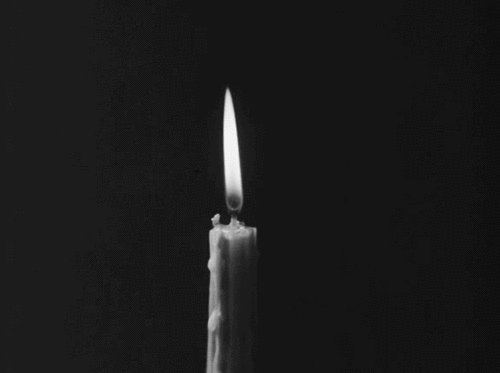
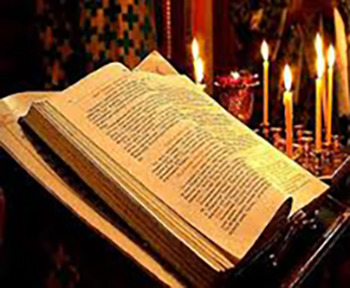
ISAIAH 4:2-5:7
2 In that day the Branch of the Lord shall be beautiful and glorious; And the fruit of the earth shall be excellent and appealing For those of Israel who have escaped. 3 And it shall come to pass that he who is left in Zion and remains in Jerusalem will be called holy—everyone who is recorded among Jerusalem's people. 4 When the Lord has washed away the filth of the daughters of Zion, and purged the blood of Jerusalem from her midst, by the spirit of judgment and by the spirit of burning, 5 then the Lord will create above every dwelling place of Mount Zion, and above her assemblies, a cloud and smoke by day and the shining of a flaming fire by night. For over all the glory, there will be a covering. 6 And there will be a tabernacle for shade in the daytime from the heat, a place of refuge, and a shelter from storm and rain.
1 Now let me sing to my Well-beloved A song of my Beloved regarding His vineyard: My Well-beloved has a vineyard On a fruitful hill. 2 He dug it up and cleared out its stones, And planted it with the choicest vine. He built a tower in its midst and also made a winepress in it. He expected it to bring forth good grapes, but it brought forth wild grapes. 3 “And now, O inhabitants of Jerusalem and men of Judah, Judge, please, between Me and My vineyard. 4 What more could have been done to My vineyard That I have not done in it? Why then, when I expected it to bring forth good grapes, Did it bring forth wild grapes? 5 And now, please let Me tell you what I will do to My vineyard: I will take away its hedge, and it shall be burned, And break down its wall, and it shall be trampled down. 6 I will lay it waste; It shall not be pruned or dug, but briers and thorns shall come
. I will also command the clouds That they rain no rain on it.” 7 For the vineyard of the Lord of hosts is the house of Israel, And the men of Judah are His pleasant plant. He looked for justice, but behold oppression; For righteousness, but behold, a cry for help.
GENESIS 3:21-4:7
21 Also for Adam and his wife the Lord God made tunics of skin, and clothed them. 22 Then the Lord God said, “Behold, the man has become like one of Us, to know good and evil. And now, lest he put out his hand and take also of the tree of life, and eat, and live forever”— 23 therefore the Lord God sent him out of the garden of Eden to till the ground from which he was taken. So He drove out the man; and He placed cherubim at the east of the garden of Eden, and a flaming sword which turned every way, to guard the way to the tree of life.
1 Now Adam knew Eve his wife, and she conceived and bore Cain, and said, “I have acquired a man from the Lord.” 2 Then she bore again, this time his brother Abel. Now Abel was a keeper of sheep, but Cain was a tiller of the ground. 3 And in the process of time it came to pass that Cain brought an offering of the fruit of the ground to the Lord. 4 Abel also brought of the firstborn of his flock and of their fat. And the Lord respected Abel and his offering, 5 but He did not respect Cain and his offering. And Cain was very angry, and his countenance fell. 6 So the Lord said to Cain, “Why are you angry? And why has your countenance fallen? 7 “If you do well, will you not be accepted? And if you do not do well, sin lies at the door. And its desire is for you, but you should rule over it.”
#orthodoxy#orthodoxchristianity#easternorthodoxchurch#originofchristianity#spirituality#holyscriptures#bible#wisdom#saints
4 notes
·
View notes
Text

"You should not think that because you worked exceptionally hard today you should reduce your prayer on account of bodily exhaustion. For however greatly you exert yourself in performing your duties, you should be aware that you have lost something of great value if you deprive yourself of prayer."
-St. Symeon the New Theologian-
#eastern orthodox#greek orthodox#quote#st symeon the theologian#prayer#exhaustion#prayer life#orthodox saint
10 notes
·
View notes
Text

—St Symeon the New Theologian
#St Symeon the New Theologian#Symeon the New Theologian#orthodoxy#orthodox christianity#mysticism#uncreated light#philokalia#hesychasm#prayer#grace#divine light#theology
35 notes
·
View notes
Text
For we wrestle not against flesh and blood, but against principalities, against powers, against the rulers of the darkness of this world, against spiritual wickedness in high places.
- Ephesians 6:12
For by him were all things created, that are in heaven, and that are in earth, visible and invisible, whether they be thrones, or dominions, or principalities, or powers: all things were created by him, and for him:
- Colossians 1:6
Therefore, since we are surrounded by such a great cloud of witnesses, let us throw off every encumbrance and the sin that so easily entangles, and let us run with endurance the race set out for us. Let us fix our eyes on Jesus, the author and perfecter of our faith, who for the joy set before Him endured the cross, scorning its shame, and sat down at the right hand of the throne of God.…
- Hebrews 12:1-2
For I am sure that neither death nor life, nor angels nor rulers, nor things present nor things to come, nor powers, nor height nor depth, nor anything else in all creation, will be able to separate us from the love of God in Christ Jesus our Lord.
- Romans 8:38-39
The demons begged Jesus, “If you drive us out, send us into the herd of pigs.”
- Matthew 8:31
I find it odd that a professed Christian is willing to accept the "Magic Man in the Sky" concept while mocking the "principalities and powers of this world" as naïve. If you accept the one, the other must at least be plausible.
As an Adventist, I would expect an even greater sympathy for the unseen given that there's an elaborate "investigative judgement" as part of our soteriology to prove the righteousness of God to the universe/cosmos.
I think there are several threads of thought here that I'm trying to untangle.
The first is an overly materialist view of the Universe, an Atheistic Therapeutic Deism view of life. I have no idea what the person who wrote this article thinks heaven might be like, if he even believes in a heaven or if that idea slips into his category of superstitious fantasy. What about a bodily resurrection - realistic, or fantastic? What exactly does he think Christianity is if not acknowledging and engaging with the powers of light and darkness that surround us? Is all "demon possession" merely an imbalance of the humors, or perhaps, just "an undigested bit of beef, a blot of mustard, a crumb of cheese, a fragment of underdone potato"?
It's hard to say. He seems to be intellectually conflicted, and completely unsure as to what he believes.
A double minded man is unstable in all his ways.
- James 1:8
Depending upon a man's disdain for the spiritual, this line of thinking could lead to a very narcissistic Theology. One that emphasizes embracing and enjoying modern materiality culture such as lust, ambition, and avarice over the spiritual fruits of the Spirit.
The second thread of thought here, after embracing materiality over spirituality, is the idea that the Bible can't be trusted.
Now, I've made it clear that I'm not necessarily a Sola Scriptura kind of guy, but that doesn't mean that I replace it with modern notions of critical scholarship that throws out what I don't like, and interprets the rest to conform to my biases, proclivities, and passions.
Big No.
I look to those who think and write in the oldest Christian traditions I can find. Some of them may actually be modern, but all have been immersed in the waters of an ancient Christian Orthodoxy that predates Luther and even Pope Leo IX.
Thinkers who write in a tradition that predates all the Christian Schisms in the West. St. Isaac the Syrian, St Athanasius the Great, St. Gregory Palamas, St. Anthony the Great - many of the desert fathers to be sure - St. Gregory of Nazianzus, St. Irenaeus, St. John Chrysostom, St. Symeon the New Theologian, Pseudo-Dionysius the Areopagite, among many, many others.
The truth is, if you believe in God, and in his angels, then you must also recognize that Satan and demons exist too. They are two sides of the same coin. To think otherwise is to assert that we live in the best of all possible worlds - because only God and his angels exist.
I contend that we do not, in fact, live in the best of all possible worlds.
Lord Jesus Christ, Son of God,
Have Mercy upon me,
A Sinner.
#Materialism#Spirits#Spirituality#Powers#Principalities#Demonic Posession#God#“Magic Man in the Sky”
5 notes
·
View notes
Text
2023 SEPTEMBER 02 Saturday
"Therefore understand me that so also God has made us each faithfully to operate in the works of this life. For behold, just as it is never possible that any of the tools mentioned moves itself to its work, or anything operates without a human hand taking something and making something else with it, so also a human being without the divine hand cannot know or do anything good. For behold, the Artisan, the Logos, made me, and He has placed in the world whatever kind He wanted. Therefore how, tell me, how shall I be able to think, or to make, or to operate anything without divine strength?"
~ Symeon the New Theologian, Hymns of Divine Love 54
#bible#gospel#further reading#Symeon#Symeon the New Theologian#hymns#Hymns of Divine Love#God#Lord#Jesus#Christ#made us#faithfully#to operate#work#life
0 notes
Text
Saint Symeon the New Theologian describes the saints as forming a golden chain:
The Holy Trinity, pervading all men from first to last, from head to foot, binds them all together . . . The saints in each generation, joined to those who have gone before, and filled like them with light, become a golden chain, in which each saint is a separate link, united to the next by faith, works, and love. So in the One God they form a single chain which cannot quickly be broken,
Such is the Orthodox idea of the communion of saints. This chain is a chain of mutual love and prayer; and in this loving prayer the members of the Church on earth, 'called to be saints', have their place.
-- Kallistos Ware, The Orthodox Church
12 notes
·
View notes
Photo

“We awaken in Christ’s body
as Christ awakens our bodies,
and my poor hand is Christ, He enters
my foot, and is infinitely me.
I move my hand, and wonderfully
my hand becomes Christ, becomes all of Him
(for God is indivisibly
whole, seamless in His Godhood).
I move my foot, and at once
He appears like a flash of lightning.
Do my words seem blasphemous? — Then
open your heart to Him
and let yourself receive the one
who is opening to you so deeply.
For if we genuinely love Him,
we wake up inside Christ’s body
where all our body, all over,
every most hidden part of it,
is realized in joy as Him,
and He makes us, utterly, real,
and everything that is hurt, everything
that seemed to us dark, harsh, shameful,
maimed, ugly, irreparably
damaged, is in Him transformed
and recognized as whole, as lovely,
and radiant in His light
he awakens as the Beloved
in every last part of our body.”
~St. Symeon the New Theologian
(Image: St. Symeon the New Theologian as a Christ-Bearer)
#Poetry#Poets#saints#St. Symeon the New Theologian#Christ-Bearer#Orthodox Christian#hymn#Body of Christ#Christ in us
24 notes
·
View notes
Text

St. Symeon the New Theologian taught:
Once the morning Office of praise is finished, do not, as soon as you have left the church, start talking to one man and the other and so be distracted in idle talk.” … If on your way [back to your cell] you see a brother by himself, or sitting down with others and chatting outside the time, make a reverence and pass in silence. Do not go to sit with them, but be mindful of the psalmist’s saying, “Blessed is the man that hath not walked in the counsel of the ungodly, nor stood in the way of sinners, and hath not sat in the seat of the scornful.” For such people are a plague, as Paul says, “Bad company ruins good morals.” If a plague is anything, so is also corruption. Do not then, beloved, sit with those who talk idly, and do not say, “I too want to hear what you are saying,” but as I have said, make a reverence and pass by. Observe silence and solitude: silence by saying to yourself, “What good have I to say, who am altogether mud and a fool? Besides, I am a stranger and unworthy to speak and listen and to be numbered among men.”
16 notes
·
View notes